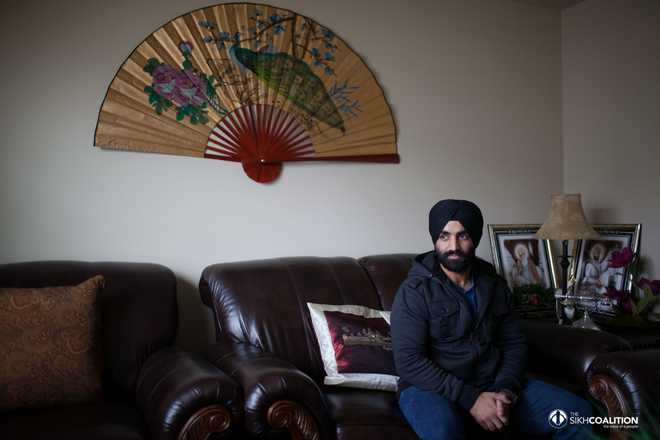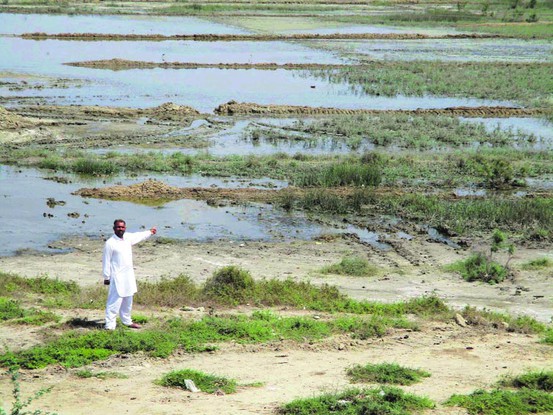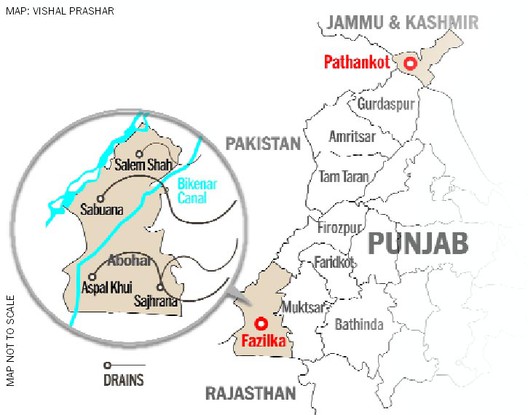
BSF to unveil tallest national flag









ACCUSED WAS ABSCONDING SINCE 2014 WHEN HE WAS BOOKED FOR DUPING A MAN ON THE PRETEXT OF SENDING HIM ABROAD
LUDHIANA: Police on Sunday arrested an ex-armyman for duping a man of `5.5 lakh on the pretext of sending him abroad.
HT PHOTOThe accused in the custody of Division Number 5 police in Ludhiana on Monday.
The accused identified as Manjit Singh Grewal (60) of Shalu Bhaini village of Koomkalan indulged in duping people to make easy money after retiring from army, police said.
Division Number 5 SHO Beant Juneja said, “The accused, who retired as head constable from army, was arrested in a two-yearold fraud case.”
The SHO said, “A case under Section 420 (cheating) of the IPC was registered against Grewal in 2014 with Division Number 5 police following the complaint of Jugraj Singh of Bansipura village of Jagraon. In his complaint, Jugraj stated that he came in contact with accused through a friend. The accused promised to send him abroad and demanded `5.5 lakh from him. But, the accused neither sent him abroad, nor returned the money, he alleged.”
“The accused had been absconded since the case was registered. On Sunday, police arrested him from Shalu Bhaini village following a tip-off,” the SHO said.
“Police found that the accused has been facing trial in similar cases at Shimlapuri, Koomkalan and Sahnewal. He had duped many people in a similar way. On Monday, he was produced before the court that remanded him to one-day police custody,” Juneja said.

Sarika Sharma
Tribune News Service
Chandigarh, April 1
In a landmark decision, decorated Sikh American soldier Captain Simratpal Singh has been allowed to maintain his articles of faith while serving in the US army. He becomes the fourth Sikh to have been granted the opportunity to serve without removing unshorn hair and turban since a restrictive ban was implemented in 1981.Captain Simratpal Singh had joined the United States Military Academy at West Point 10 years ago and had to cut his hair and shave his beard to join the US army. After successfully completing the Army Ranger School, a Bronze Star tour in Afghanistan, and receiving numerous other military accolades, he filed a religious accommodation request on October 21, 2015.Throughout this process, the Department of Defence made attempts to delay and prohibit his accommodation, including an attempt to subject Capt Singh to discriminating testing, which the court denied.Singh said that through all these years he spent serving the nation, one thing he regretted was compromising his religion in order to serve his country.On Tuesday, another three Sikh American soldiers had filed a lawsuit in a US federal court against the Department of Defence. Specialist Kanwar Singh, Specialist Harpal Singh and Private Arjan Singh Ghotra had sought the right to serve their country without being forced to compromise their religion in the process.
Beijing, April 20
India and China today agreed to adhere to “peaceful negotiations” to settle the vexed border issue and reach a “fair, reasonable and mutually acceptable solution”, amid negativity over Beijing’s blocking of India’s bid in the UN to ban Pakistan-based JeM chief Masood Azhar.The decision was taken during the annual 19th round of boundary talks between National Security Adviser Ajit Doval and his Chinese counterpart Yang Jiechi. Both leaders had an “extensive, deep and candid” discussion on the 3,488 km-long Line of Actual Control, which remains undemarcated resulting in tensions between the two nations.Besides the border issue, Doval and Yang have a larger mandate to discuss all contentious bilateral, regional and international matters.Welcoming Doval, Yang in his opening remarks at the meeting said: “Your visit fully signifies the importance Indian side attaches to this meeting and the efforts to further promote the strategic partnership between China and India. China-India relations carry special significance. China stands ready to use this important occasion to have a broad-ranging in-depth and candid discussion with Indian side on the bilateral relations, boundary question, regional and international issues and other issues of shared interest.” Doval spoke about the importance of informal talks, saying “not talking from the mind but also from the heart”.
Islamabad, March 31
Pakistan today said it had informed the European Union and major world capitals about the arrest of an Indian “spy” from restive Balochistan province and asked Iran to provide details of his “spy network”.Kulbhushan Yadav, alleged chief operative of the Research and Analysis Wing (RAW), was arrested by Pakistani security agencies from Chaman, near Quetta, last week.Foreign Office spokesperson Nafees Zakaria said major world capitals and EU had been informed about the arrest of a serving Indian Navy officer for planning “subversive activities” in Pakistan.The entire world has seen the admission statement of the Indian agent, Zakaria said, referring to the so-called “confessional video” of Yadav released earlier this week by the Pakistan army.Zakaria said Pakistan had earlier provided the United Nations with evidence of Indian interference and terror activities in Pakistan.India has acknowledged Yadav as a retired Indian Navy officer, but denied the allegation that he was in any way connected to the government.“The said individual has no link with the government since his premature retirement from the Navy,” said a statement issued by India’s Ministry of External Affairs, while demanding counsellor access to him. — PTI
Living near the border is like being perched on a live wire. The entire border belt starting from Fazilka up to Gurdaspur is an example of how things have become increasingly difficult for villagers over the years. There are no jobs, no worthwhile healthcare and crops in large tracts have been damaged by water-logging. Coupled with this is the tense security situation post Pathankot and Dinanagar terror attacks. Sarbjit Dhaliwal & Prashant Saxena travel along the route

A farmer points to a pool of drained out water in a vast stretch in Fazilka. Tribune Photo
There are signs of dystrophic malfunction in government machinery as you move beyond vast stretches of agricultural land along the Indo-Pak border from Abohar-Fazilka up to Pathankot. As the wheat crop takes a golden hue, the barbed fencing demarcating the two sides becomes invisible. You don’t even remember the names of villages; their very existence tends to be strangely surrealistic, a kind of reassertion of the ennui of the last over 67 years of partitioned history. One village here, another across the fence, tons of wheat here and tons there, roars of ‘Bharat mata ki jai’ inches within and ‘jive jive Pakistan’ a few yards away. For those looking for a radical dissimilarity in anything of substance, here’s some laconic levity in the tedium: Both sides live off water, land and air! And since this side is clearly visible, there is a perception of a deliberate attempt to keep the people off their main occupation: vast swathes of farmland lie waterlogged in the Fazilka belt, because of the natural gradient that sends even sewage water being drained out of Muktsar, the home district of Chief Minister Parkash Singh Badal, to these areas. There has been no crop for the last about two years as frothy, murky water has turned the soil into saline crust.

Official communications are slow and verbose, as officials blame Pakistan for building a bandh on their side restricting the natural flow. Indebtedness among farmers is thus rampant, and coupled with the lack of job avenues, the voices of resentment are getting louder. Trading activity across Sadiqe and Husseniwala, locked after wars with Pakistan, is something everyone wants resumed, but no one knows how. In the gamut of living, there are undiagnosed diseases among children at Teja Rohela, where some kind of muscular dystrophy or bone deformity has affected many children: they can’t walk, they crawl. Though various government and NGO surveys blame bad water and soil, none has reached a definite conclusion. There are no hospitals, only Job’s comforters. As The Tribune team travels along Fazilka-Ferozepur-Amritsar-Pathankot border route, there is much more, something well-wrapped in government files, and something such plain sight that no one really cares to feel.
Driven to debt

In village like Shajrana, well-off farmers are now feeling helpless. “Farmers with up to 80-acre land are forced to buy wheat because no crop grows in their fields due to water logging,” says Om Singh, sarpanch of the village. In and around the village, about 700 acres have been rendered infertile. “Many who once owned tractors work as labourers,” says Om Singh. “Most of the villagers are under debt.” There are pools of accumulated water in fields at Shajrana village. There is vast web of drains in the Abohar-Fazilka-Jalandhar belt. These include Aspal, Khui Kheria, Sajhrana, Bam, Salem Shah and Fazilka drains. Many of them emerge from the Muktsar region. The perception among people, especially, the ones living in the village near border in Fazilka district, is that since CM Badal wanted to get rid of water-logging in his home town Muktsar, several new drains were dug up in the area. Starting from the Lambi constituency and other parts of Muktsar these drain out into the Fazilka belt.”The Abulkhurana drain is a big nuisance. It carries filthy sewer water of Abohar town,” says Sohan Lal, a farmer and member of Panchayat Samiti. He says farmers plan to move the high court.But officials of the drainage department reject such accusations. The natural flow of water is towards Fazilka. So, water is bound to flow to that side before falling into the Sutlej. “Over the years, the state government has spent about Rs 3,000 crore in the entire Fazilka-Muktsar region solve water-logging,” says an official of the drainage department. Secretary Irrigation KS Pannu says Rs 90 crore were spent on anti-water-logging measures in Fazilka district in 2014-15 and Rs 120 crore were spent during the last fiscal year. Government officials in Fazilka blame Pakistan. Some of the drains end up in the main creek of the Sutlej that crisscrosses the international Border in Ferozepur-Fazilka belt. Farmers accuse Pakistan of blocking the flow of drains in its territory by building a bandh. Under the Indus Water Treaty-1960, Pakistan is supposed to de-silt and maintain the drains such as the ones at Salimshah, Fazilka, Hudiara and Kasur Nala which flow from the Indian side to its territory. They say the spillover from the drains often floods their crops. “We own 50 acres near the border. We also have a small tract of land across the fence on the border. We grow paddy and wheat. Flooding caused by Pakistan has made us unable to harvest last four crops. We did not get any compensation,” says Milkh Raj of Beriwala village.Additional Deputy Commissioner Development Charandev Singh Mann says about Rs 152 crore was given as compensation to farmers whose cotton crop was damaged by white fly besides about Rs 18 crore to the landless labourers affected by crop failure.Secretary Irrigation KS Pannu says the Punjab Government has written to Commissioner (Indus), Ministry of Water Resources, to take up de-silting and de-weeding of the Fazilka and other drains with Pakistan in their territory. “We have sent additional information sought by the Commissioner. De-weeding is also required inside the Indian territory.”There are hundreds of farmers who own land across the fence in about 212 villages located along the border in the Punjab region. They have been demanding relaxation in restrictions on movement. Recently when a parliamentary committee attached to the Home Affairs visited the border belt, Akali MP member Prem Singh Chandumajra suggested the government exchanged some land across the fence, wherever possible, with Pakistan. This can relieve the pressure on farmers.
Ray of hope
Hussainiwala and Sadiqe border posts were transit points until the Indo-Pak war in 1971. Trucks loaded with grapes and dry fruits arrived from Afghanistan and unloaded at the Hussaniwala post. Before Partition, there was a direct rail link between Delhi-Ferozepur-Lahore via Kasur. This line was intact till 1971. Now, all trade is done through the Attari-Wagah border post. With the opening of Hussainiwala and Sadiqe, the entire scenario in the border belt will change. It would create jobs, make industrialists think about setting up units near the border to avoid transportation cost and engineer the process of development, especially the manufacturing sector. Whenever, any senior Minister visits the memorial of Shaheed Bhagat Singh and other martyrs, people of the area demand only one thing: reopen the Hussaniwala and Sadiqe posts.
Teja Rohela’s curse
As she tries to tell the name of her five-year-old bedridden grandson, her voice starts sinking. “He was about one when he started facing difficulty in standing straight and moving about. Since then, we have spent thousands of rupees on his treatment, but there is no relief,” says Paro as she watches Swaran.”He remains confined to bed mostly. He cannot sit without support, cannot eat anything himself and even cannot remove flies from his face,” she says. There is 10-year-old Jashandeep. He crawls. His family too, has no hope. There about 14 other boys and girls in the Teja Rohela village, at a short distance from border near Fazilka, suffering from some kind of degenerative disorders like dystrophy. “These families are poor and under heavy debts,” says Raj Singh, who is holds a professional degree to teach special children.Health experts have not been able to pinpoint the exact reason. “No one has come forward to help us. We feel left out. For us, government and doctors don’t exist,” says Varinder, mother of a sick boy.state Health Minister Surjit Kumar Jayani and AAP’s convener Arvind Kejriwal have visited the village and met the families. Experts from diverse fields such as health and environment have also visited the place. But nothing has happened and villagers continue to depend on costly private health institutions.
Shadow of terror
Post Pathankot and Dinanagar terror attacks there is no visible panic among people. Yet they have bitter memories of 1965 and 1971 wars. Pardeep Kumar, who lives in a village near the border in Fazilka, says his house was damaged in both the wars. Even during the Kargil war, people of his village were asked to vacate the village because the Army had moved in close to the border. Villagers want senior security officials to stay at least a week in these areas to have the first-hand experience of the difficulties. Near the Dinanagar police station as well as around Pathankot airbase, heavy civilian population makes the two places vulnerable to attacks. Deputy Commissioner of Pathankot Amit Kumar says he has directed officials to remove unauthorized establishments from the periphery of the defence installations. The civil administration cannot interfere in the land owned by defence forces. The DC said there would be a meeting between civil and defence officials next month on ways to remove encroachment.(With inputs from Praful Nagpal, Anirudh Gupta)Border basics553 km Length of Indo-Pak border in Punjab
461 KmFenced and withfloodlights
River stretches are not fenced

London, April 6Scientists have discovered a new biochemical process, which reveals how the lungs operate during normal functioning and during asthma — a chronic respiratory condition marked by difficulty in breathing.The study conducted in mouse model reveals how air enters and leaves the lungs.The findings showed that disrupting these biochemical pathways in a mouse model could prevent airway narrowing and maintain normal lung function.”The fundamental biochemical process that we have discovered will ultimately allow us to better design ways to develop new treatments for those suffering from asthma and chronic obstructive pulmonary disease (COPD),” said one of the researchers Andrew Tobin, professor at the University of Leicester in Britain.It is too early to say whether these results apply to humans, the researchers maintained in the study published in the journal Proceedings of the National Academy of Sciences.The lung is made up of tiny tubes called airways, surrounded by muscles that allow air in and out of the lung.In asthma and other airway diseases such as COPD, the airway muscle contracts causing the airways to become narrow and restricting the flow of air in and out of the lung.”This breakthrough will lay the essential foundations on which to build new strategies to combat airway diseases such as asthma,” added Tobin.According to the World Health Organisation estimates, 235 million people worldwide currently suffer from asthma with over 80 percent of asthma deaths occurring in low and lower-middle income countries. The disease is predicted to increase worldwide over the next 10 years. — IANS

he Indian Air Force has renamed West Bengal’s Panagarh airbase as ‘Air Force Station Arjan Singh’ after the former IAF chief. “It is… the first time that we have taken a conscious decision to rename an airbase after an individual,” an officer said. Notably, Singh, having the rank of ‘Marshal of the IAF’, is the IAF’s only ‘five-star’ rank officer.
The renaming of the Air Force Station was announced by Chief of Air Staff Arup Raha at a function in Delhi to mark Singhs birthday.
Addressing a simple renaming ceremony in Panagarh, Air Officer Commanding-in-Chief, Eastern Air Command Air Marshal C Hari Kumar said, “It is a proud moment for the Indian Air Force and the state of West Bengal.”
“He is an icon and a role model. We have to work hard to ensure that the name is suitably looked after in terms of capability and performance. It is for the first time that we have taken a conscious decision to rename an airbase after an individual,” Air Marshal Kumar said.
An icon of the Indian military history, Singh, the first Indian Air Force Chief to lead a young IAF into war in 1965, was hardly 44 years of age when entrusted with the responsibility.
Air Force Station Arjan Singh in Panagarh, approximately 150 kms from Kolkata, will house the C-130J military transport aircraft, capable of carrying out special operations. These planes will be flying with the Mountain Strike Corps along areas bordering China. PTI NIK SAP SMN SC SMN
Ajay Banerjee
Tribune News Service
New Delhi, April 15
Defence Minister Manohar Parrikar, when he leaves for China tomorrow, will carry an important message for Beijing’s top leadership: “We don’t treat you as an enemy and nor does India equate China and Pakistan.”Parrikar, who was scheduled to leave on April 17, has advanced his visit by a day so that he can fly Air India instead of flying out on a Chinese airline the next day. He also opted out of using a personal jet. He will be in Shanghai to meet the Indian business community before flying off to Beijing.In China, his meetings with the government start on April 18 where he would tell the leadership that India does not hyphenate Pakistan-China and both are separate countries for New Delhi, said sources while telling the key agenda points for Parrikar’s meetings.He will address issues of cooperation in the Indian Ocean. China and India already conduct coordinated anti-piracy patrols along the Yemen and North-East Africa coastline of the ocean. China is sensitive to maintain security of the sea lines of communications used by merchant ships as millions of tonnes of its crude oils pass very close to India’s west coast and also close to the Andaman and Nicobar islands on the east edge of Bay of Bengal.Parrikar and his high-level team will be discussing expansion of military exchanges at senior levels and allow each other’s officers into top military institutions like the National Defence College in Delhi.China is preparing to send its troops for UN peacekeeping mission and India has more than 50 years of experience in such missions.The Indian delegation will be meeting Chinese premier Li Keqiang followed by a meeting with General Fan and latter with Defence Minister Chang Wanquan. Parrikar will also visit the headquarters of the Chengdu Military area command which is tasked to face India.He shall be accompanied by Defence Secretary G Mohun Kumar, Director General of Military Operations (DGMO) Lt Gen Ranbir Singh, Vice Chief of the Indian Air Force Air Marshall BS Dhanoa and Chief of the Navy’s Western Command Vice Admiral Sunil Lanba.






















































